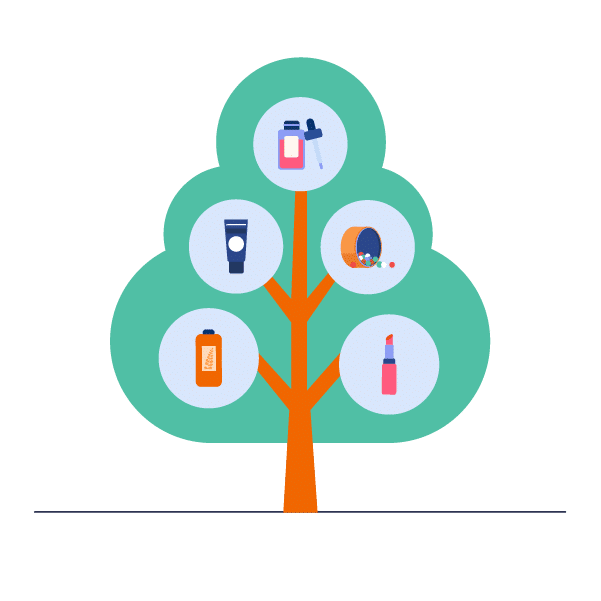Environmental Social Governance, or ESG in short, is a topic we covered extensively in a few posts. In essence, ESG is a framework for evaluating a company or business’s sustainability and ethical impact. As the name suggests, ESG is divided into three components – Environmental, Social, and Governance.
The environmental component examines a company’s impact on natural resources, climate change, and pollution. The social component examines how the company treats its employees, customers, and suppliers and its impact on communities. The governance component evaluates the company’s leadership, management practices, and transparency in reporting financial and non-financial information. It is important to note that ESG factors are interrelated and can affect a company’s long-term sustainability and performance.
For the cosmetics industry, being ESG compliant and prioritizing ESG is critical, from having environmentally friendly manufacturing processes, using sustainable raw materials, having ethical methods for testing products (which safeguard animal welfare for example), ensuring human rights integration within their supply chain, using eco-friendly packaging, being transparent in labeling to having diversity and inclusion within their own business from the board to the management, to the employees and so on. Having an ESG focus can ensure companies in the cosmetic industry accrue benefits from gaining consumer loyalty, improving financial performance (through cost-savings & efficiency measures), attracting and retaining employees, mitigating future risks, and enhancing brand reputation, among many other benefits, as seen with many cosmetic brands which have prioritized ESG considerations.
Ten things about ESG that you ought to know
- ESG refers to the three key factors that measure the sustainability and ethical impact of an investment in a company or business. Environmental refers to the company’s impact on the environment, social to its impact on society, and governance to the company’s management practices and transparency. With respect to the cosmetics industry, some examples of ESG adherence and prioritization can be:
- On the environmental front, a cosmetic company can ensure environmentally harmful substances and materials (such as microbeads) are not used for production, not testing on animals, ensure operations are run using renewable energy, integrate circular economy practices to reduce waste generated (like reverse logistics where disposed cosmetic products are returned to the manufacturer for recycling), using eco-friendly packaging and being resource efficient (reducing energy & water use).

- On the social front, a cosmetic company can be more inclusive and diverse when it comes to their management and employees, have safety measures during production to protect workers, and have fair labor practices across the value chain like ensuring forced labor or child labor is not used in their supply chain by ensuring ethical sourcing, and by engaging positively with communities in the vicinity of cosmetic production sites.
- On the governance front, a cosmetic company can ensure the board and leadership are diverse, ethical policies govern the company, risk management processes are integrated, ensuring transparency within the company and by being compliant with all regulations & tracking them effectively (given those regulations in the industry are constantly evolving).
- On the environmental front, a cosmetic company can ensure environmentally harmful substances and materials (such as microbeads) are not used for production, not testing on animals, ensure operations are run using renewable energy, integrate circular economy practices to reduce waste generated (like reverse logistics where disposed cosmetic products are returned to the manufacturer for recycling), using eco-friendly packaging and being resource efficient (reducing energy & water use).
- ESG investing is becoming increasingly popular among investors who want to align their investments with their values. It is estimated that ESG funds have grown to over $1.3 trillion in assets under management. ESG investing is a way to align investments with values and promote positive social and environmental outcomes. ESG funds can invest in companies that are leaders in sustainability and social responsibility and exclude companies that engage in controversial practices, such as fossil fuel extraction or human rights violations. ESG investing can help investors to mitigate risks and support a more sustainable future. In the cosmetics industry, some of the biggest players, such as L’Oreal, Estee Lauder, and P&G Beauty, which have a strong ESG focus and sustainability engrained in their operations, along with ambitious commitments, and even smaller, emerging sustainable cosmetics companies such as EcoFabulous Cosmetics and Pai Skincare have been able to attract ESG funds and leverage the rapidly growing ESG investing scenario to get capital, based on their ESG performance[1].
- There are various ways to incorporate ESG factors into investment decisions, including negative screening (excluding companies that do not meet ESG criteria), positive screening (investing in companies that meet ESG criteria), and engagement (actively engaging with companies to improve their ESG performance). Here are some examples of negative, positive, and engagement screenings. Negative screening excludes companies that do not meet certain ESG criteria, such as companies with poor environmental track records or unethical labor practices. Positive screening focuses on investing in companies that meet high ESG standards, such as companies with a strong commitment to renewable energy or employee diversity. Engagement involves actively working with companies to improve their ESG performance through dialogues, shareholder resolutions, or proxy voting. With respect to the cosmetic industry, negative screening can help ESG investors weed out cosmetics brands that have unethical practices, such as animal testing or microbeads being used in their products, positive screening can help ESG investors identify cosmetics companies with high ESG standards and performance (like Kao, P&G Beauty, Estee Lauder, The Body Shop, L’Oreal), and engagement with cosmetics companies by ESG investors, especially for emerging, promising brands with high potential can incentivize more players to integrate ESG in their companies.
- ESG factors can have a significant impact on a company’s financial performance. A company with poor ESG performance may face reputational risks, legal liabilities, and increased regulatory scrutiny, which can affect its profitability and long-term sustainability. For example, a company with a high carbon footprint may face regulatory penalties, consumer boycotts, and stranded assets as the world transitions to a low-carbon economy. Conversely, companies prioritizing ESG can benefit from improved stakeholder trust, increased customer loyalty, and reduced regulatory risks. For example, in 2020, The Body Shop, a cosmetics company known for its ethical and sustainable practices, secured $1 billion in funding, that is tied to its environmental and social performance and conditionally linked on its sustainability goals[2].
- Environmental factors in ESG include climate change, pollution, resource depletion, and waste management. Companies that manage their environmental impact effectively can reduce costs, improve their reputation, and create opportunities for innovation and growth. Environmental factors can have a significant impact on a company’s financial performance. For example, energy-efficient buildings can reduce operating costs, while sustainable sourcing practices can improve supply chain resilience and brand reputation. Companies prioritizing environmental sustainability can also create opportunities for innovation, such as developing new technologies to reduce waste or improve resource efficiency. Some examples of cosmetics companies with positive environmental initiatives include:

- L’Oreal has committed to reducing GHG emissions from the transportation of their products by 50% by 2030 from 2016 levels, and a commitment that their strategic suppliers will reduce direct emissions by 50% in absolute terms by 2030, from 2016 levels[3].
- The Body Shop has implemented a “bio-bridges” program, which involves restoring and protecting forests in key areas worldwide.
- Aveda uses 100% post-consumer recycled plastic for its packaging.
- Social factors are increasingly important for companies seeking to build trust and loyalty with customers, employees, and communities. Social factors in ESG include labor practices, human rights, diversity, and community relations. Companies prioritizing social responsibility can improve employee morale, attract and retain talent, and build trust with customers and communities. For example, companies prioritizing employee wellbeing, such as flexible work arrangements or paid parental leave, can attract and retain top talent. Companies that support local communities through charitable giving or volunteering can also enhance their reputation and social license to operate. Some examples include:
- Estee Lauder has a diversity and inclusion program, which aims to increase the representation of underrepresented groups in leadership positions.
- Lush’s “Charity Pot” program donates a portion of sales to grassroots organizations working on issues such as animal rights, human rights, and environmental conservation.
- Good governance is essential for companies to operate transparently, accountably, and responsibly. Governance factors in ESG include board composition, executive pay, shareholder rights, and transparency. Companies with good governance practices can improve decision-making, reduce the risk of fraud and corruption, and enhance shareholder value. Companies with strong governance practices can mitigate fraud, corruption, or executive misconduct risks. They can also improve decision-making, reduce conflicts of interest, and enhance shareholder value. Examples of good governance practices include independent board oversight, effective risk management, and transparent reporting of financial and non-financial information. Some examples within the cosmetics industry include:
- L’Oreal has a Code of Ethics and Chief Ethics Officer to ensure good and ethical governance.
- Several cosmetics brands like Kylie Cosmetics, Ulta Beauty, Huda Beauty etc. have extremely diverse board membership compositions, and employee base[4].
- ESG criteria can vary depending on the industry, geography, and investor preferences. For example, a technology company may be evaluated on its data privacy policies, while a mining company may be evaluated on its water management practices. Another example is that a food industry company may be evaluated on its animal welfare policies, while a healthcare company may be evaluated on its drug safety record. ESG criteria can also evolve as new social and environmental challenges emerge and stakeholders demand more accountability and transparency. For the cosmetics industry, the ESG criteria normally is around product safety, supply chain transparency & practices, environmental impact (including animal welfare) of operations & products, and diversity & inclusion, which are material topics for the industry from an ESG standpoint.

- ESG data and ratings are increasingly available from third-party providers, such as MSCI, Sustainalytics, and Bloomberg. However, there is no universal standard for ESG data, and different providers may use different methodologies and criteria. This can lead to inconsistencies in data quality, relevance, and comparability. It is important for investors and companies to use ESG data as a starting point for analysis and to complement it with their own research and due diligence.
- ESG is not just about investing but also about corporate responsibility and sustainability. Companies prioritizing ESG can create long-term value for their stakeholders, including employees, customers, shareholders, and the environment. Furthermore, ESG is not just a trend or buzzword but a fundamental shift in how businesses operate and create value. Companies prioritizing ESG can create shared value for their stakeholders, including employees, customers, and society. Cosmetics companies with an ESG focus and prioritize it have known to have good reputations among the stakeholders, mitigated risks related to non-ESG compliance, increased customer loyalty (translating to better financial performance), have been at the cutting-edge of innovation and gained a competitive edge, among other benefits. ESG-focused cosmetics companies also can leverage their sustainability prioritization for effective customer marketing.
Conclusion
ESG considerations are increasingly important for companies to build stakeholder trust, mitigate risks, and promote sustainable practices.
Companies prioritizing ESG can create shared value for their stakeholders, including employees, customers, and communities, while promoting positive social and environmental outcomes. Implementing ESG considerations can also help companies anticipate and address emerging social and environmental risks and regulatory and reputational challenges. Ultimately, the decision to adopt ESG considerations will depend on a company’s values, strategy, and goals, as well as the preferences and demands of its stakeholders.
For the cosmetics industry, the ESG focus can literally give the industry a much-needed make-over, no pun intended. The beauty, ironically, as it seems, is in being greener and more ethical.
How RegASK can help monitor ESG regulations and improve ESG compliance
RegAlert is an artificial intelligence platform created by RegASK to monitor the changing ESG landscape for an accurate and reliable analysis of current and emerging ESG regulatory trends.
The platform collects the latest ESG regulations published worldwide and makes the content available on an overarching dashboard to provide a consolidated view of ESG matters. Users will be notified of any changes in the ESG regulatory environment and understand key ESG trends to anticipate business risks.
For the cosmetics industry, where ESG is increasing in terms of relevance and focus, the ever-changing regulatory landscape can be challenging for cosmetics companies that are not kept up to date on these regulations, especially from an ESG perspective.
Monitoring ESG regulations with the RegAlert platform would ease the regulatory pressure, avoid non-compliance and help deliver long-term value to stakeholders for cosmetics companies leveraging this platform.
To know more about the platform, book a demo to ensure you choose the right path for monitoring ESG regulatory risks and opportunities.
More ESG reading resources:
- How is ESG Changing Business and Driving Regulations in the Food and Beverage Sector?
- Impact of ESG on the Financial Performance of the Food & Beverage Sector in the EU
- Building A Successful ESG Strategy: A Practical Guide
References:
[1] Sustainable cosmetic companies fly high as investors bet on sales growth
[2] Owner of The Body Shop Natura links financing round to sustainability goal
[3] L’Oréal – Fighting Climate Change
[4] Beauty Companies Are Revealing Their Own Lack of Diversity, Thanks to #PullUpOrShutUp Challenge

